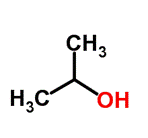
|
Frequently used names |
Isopropanol |
Enghlish name |
Isopropanol |
|
CAS |
67-63-0 |
Molecular weight |
60.095 |
|
|
Density |
0.8±0.1 g/cm3 |
Boiling point |
73.0±3.0 °C at 760 mmHg |
|
|
Molecular formula |
C3H8O |
Belting point |
-89.5 °C |
|
|
MSDS |
Chinese version |
Flash point |
11.7±0.0 °C |
|
|
Symbol |
|
Signal word |
Danger |
|
|
Chinese alias: dimethylmethanol | 2-propanol | 2-hydroxypropane |
||||
Isopropanol use
[Purpose 1]
It is mainly used in pharmacy, solvent, extractant, antifreeze, etc
[Purpose 2]
Used as experimental chemical reagent and chromatographic analysis reagent
[purpose 3]
Isopropanol is an important intermediate in pesticide production, which can produce fungicides such as Daowenling, isodaowenjing, insecticides such as amiprovos, hydrothion, methylisowillow, propoxur, fenvalerate, and herbicide isopropylamine. It can also prepare bromoisopropyl and chloroisopropyl, which are important intermediates of pesticides.
[Purpose 4]
Extraction solvent, carrier solvent. GB 2760-1996: flavors for food temporarily allowed to be used. It is used for beet sugar, candy, nutrition supplement tablet, hops extraction, lemon oil, spice oil resin, yeast and other processing.
[Purpose 5]
It is widely used as organic raw materials and solvents. As chemical raw materials, it can produce acetone, hydrogen peroxide, methyl isobutyl ketone, diisobutyl ketone, isopropylamine, isopropyl ether, isopropanol ether, isopropyl chloride, isopropyl fatty acid and isopropyl chloride. In fine chemical industry, it can be used to produce isopropyl nitrate, isopropyl xanthate, triisopropyl phosphite, triisopropanol aluminum, medicine and pesticide, etc. As a solvent, it can be used to produce coatings, inks, extractants, aerosols, etc. It can also be used as antifreeze, cleaner, additive for blending gasoline, dispersant for pigment production, fixative for printing and dyeing industry, antifogging agent for glass and transparent plastics, etc.
[Purpose 6]
Creosote, shellac, resin, gum, nitrocellulose solvent. The solvent of vegetable oil was determined by esterification analysis. Barium, calcium, copper, magnesium, nickel, potassium, sodium and strontium were determined. Determination of potassium content in soil and plants, extraction of alkaloids, pesticide analysis, etc. Organic synthesis. Antifreeze